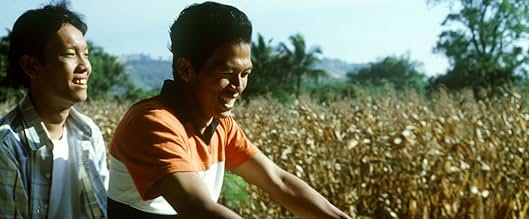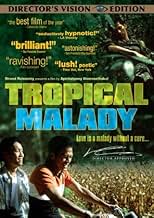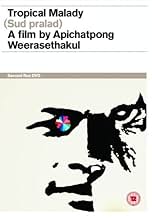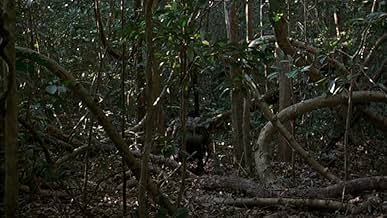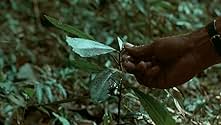AVALIAÇÃO DA IMDb
7,1/10
6,6 mil
SUA AVALIAÇÃO
Adicionar um enredo no seu idiomaA romance between a soldier and a country boy, wrapped around a Thai folk-tale involving a shaman with shape-shifting abilities.A romance between a soldier and a country boy, wrapped around a Thai folk-tale involving a shaman with shape-shifting abilities.A romance between a soldier and a country boy, wrapped around a Thai folk-tale involving a shaman with shape-shifting abilities.
- Direção
- Roteirista
- Artistas
- Prêmios
- 7 vitórias e 8 indicações no total
Avaliações em destaque
10blindg
"Tropical Malady" from the Thai director Apichatpong Weerasethakul, Jury Prize in the last Cannes Film Festival, is a movie that really consume the inside, like a terminal disease. Every senses of your body will be over-excited, there is a TERRIFIC use of sound effects, that will render the tropical forest a living entity, intelligent, thinking, speaking. The contrast between the horrors and anguishes of modern time and the most charming folk legends , that awaken the most genuine human side from the bottom of our hearts is something quite unique and unforgettable.
It's hard to tell about the story without spoil it. Watch it, no matter what.
It's hard to tell about the story without spoil it. Watch it, no matter what.
This film crushed me to the bone, exhausted my heart, and I was never again the same. It brought back faith in the uncompromised vision of cinema. Its images will forever stay in my memory; the stare of the tiger, the smell of the tropical rain...this is sensory cinema, where time is freezed and narrative is stripped, and what's left is for us to finally feel. It is utopian, but it is also sad, because we realize that there is never (and never will be) a utopia. People say love is utopian, yet according to Mr. Weerasethakul, it is also very consuming, which becomes possessive, and at the end, a burden. At the end, the soldier goes into the jungle to find what's been consuming him. The tiger. He is lost and completely hopeless; he has no purpose without the tiger, yet he cannot possibly live with the tiger because of its nature. They are co-dependent; co-exist. Is that what great love is all about?
Don't watch alone... I saw this knowing nothing about it as my pal misread the programme for the Toronto Film Festival and our first choice was not on. So, knowing nothing about it I found it lavish but disjointed... a film that frankly missed and which I feel I could have made had I had the budget. It flattered to deceive and did not deliver on its introductory references to the beast in man and the gloss of civilization. Instead we were subjected to a very personal view which failed to communicate to those that did not already know what to expect and therefore, frankly, failed. Having said that it was a great travel movie showing me parts I regret I would otherwise not reach and a brave attempt to make a very un-commercial film about something obviously very personal where the temptation to resist to commerciality or superficiality was clearly resisted
A soldier named Keng, meets a young man named Tong in Thailand, the two begin a friendship. Keng makes constant sexual and amorous advances on Tong, who laughs them off, or makes a game out of them. He is never exactly interested, but never fully rebuffs either. The two make trips back and forth from the Jungle where Tong lives and Keng is on patrol with his military unit, to the city. We see the lush silent landscapes and the bustling city life, from dance hall karaoke to the cinema to the solitude of a quiet lake. When Keng finally makes a move in such a way, as to be beyond any doubt of a desire for intimacy (he kisses Tong's hands), Tong responds in turn by doing the same, and then walks into the darkness of the forest. Before Keng, can come to understand, the film takes a drastic turn in tone, style, and mood.
We are told by an interjected 3d person narrator the story of a shaman who is a shape-shifter known to take different animal forms, who used to roam the forest playing tricks on people. One day a cunning hunter, did not fall into a trick and shot him, mid transformation from woman into tiger. The spirit of the shaman was then stuck as half tiger half man and eternally doomed to stalk the forest; tricking and devouring all in it's path.
Keng, is then on patrol in his section of the forest, exploring rumors from villagers, about some "thing" killing cattle and causing general havoc. Alone on patrol in the woods, he becomes plagued by strange sounds, a sense of dread, and images of a naked boy, a tiger, spectral animals, and a glowing phosphorescent tree (which looks as beautiful as those in Aranofsky's "The Fountain"...I have no idea how they got that effect, on their budget, but it's miraculous...).
This second half of the film, of course calls into question our understanding of Keng and Tong's prior relationship (if Tong ever existed at all.). While part one, is reminiscent of a modern quirky love story like "Chungking Express", the second half is like Terrance Mallick shooting a remake of "Predator". All sense of time and space, is swallowed by the jungle, and implicit politics of the first half are turned inside out in the second half; it is literally cat and mouse, with the possibility that the cat may want to be eaten by the mouse, or vice versa.
The second half is also marked by the inclusion of tribal art and cave paintings, depicting the story of the shaman and the soldier, with sub-titles accompanying them. To paraphrase a description by director Weerasethakul it's like "a silent film for the first people on earth". And together with the visual effects, confident cinematography, clever use of editing, music, and sound, and disarming performances, it becomes magical. "Tropical Malady" combines the most modern and ancient notions of fear and desire, and makes something "new" out of them.
This is Thailand's "Solaris", a story of the changing shapes and forms of want and need, of being deceived and allowing yourself to be deceived by them. It's slow pace, forces reflection on questions like what form or body comprises love, is it purely physical or something more, is it perhaps deception itself, a fools errand we invent to forget the savagery of the jungle around us, is it the need to devour or be devoured? There's a Scottish legend called Tam Lin (one of my favorites), long story short, a woman falls in love with a faerie, and discovers he used to be a man, but made a deal with the faeries to serve them if they spared his life, after an accident. Tam tells the women she can restore his humanity and claim him, if when the faeries pass on Halloween night, she will wrap her arms around him and not let go no matter what happens. She does this, and the faeries transform him into all manner of creature, some hot, some cold, some thorny, others slimy, some which bite and claw, etc, but she holds on throughout all his changes, til eventually she finds herself just cradling a man. And the faeries begrudgingly let her keep him, because she held on to what she loved, despite the way it changed with time.
The film opens with these lines, "All of us are by nature wild beasts, our duty as human beings is to become like trainers, who keep their animals in check. And even teach them to perform tasks alien to their bestiality"-Tom Nakajima "Tropical Malady", is a good deal more ambiguous, I suspect more predatory and reflective as well, than Tam Lin, and comes from the opposite side of the world, but like that story manages to peculiarly harmonize emotional sensitivity and mythic scope, into a coherent whole.
I wished I would have paid more attention to Weerasethakul "Mysterious Object At Noon" the first time I had the chance, he has a talent for experimenting with narrative and style that is missing in many films endlessly praised these days. The phrase I kept hearing from other reviews or the one I liked the best was "If Brokeback Mountain, was a mountain on the island from "Lost"...it's callous, with a smidgen of truth, but this is a much better movie than that. It is very slow moving though, the first hour will give you no hint of the second half (other than a few visual ones, look at the various statues in the backgrounds, etc), but for the bold and the patient, there is lush hypnotic reward to be had.
We are told by an interjected 3d person narrator the story of a shaman who is a shape-shifter known to take different animal forms, who used to roam the forest playing tricks on people. One day a cunning hunter, did not fall into a trick and shot him, mid transformation from woman into tiger. The spirit of the shaman was then stuck as half tiger half man and eternally doomed to stalk the forest; tricking and devouring all in it's path.
Keng, is then on patrol in his section of the forest, exploring rumors from villagers, about some "thing" killing cattle and causing general havoc. Alone on patrol in the woods, he becomes plagued by strange sounds, a sense of dread, and images of a naked boy, a tiger, spectral animals, and a glowing phosphorescent tree (which looks as beautiful as those in Aranofsky's "The Fountain"...I have no idea how they got that effect, on their budget, but it's miraculous...).
This second half of the film, of course calls into question our understanding of Keng and Tong's prior relationship (if Tong ever existed at all.). While part one, is reminiscent of a modern quirky love story like "Chungking Express", the second half is like Terrance Mallick shooting a remake of "Predator". All sense of time and space, is swallowed by the jungle, and implicit politics of the first half are turned inside out in the second half; it is literally cat and mouse, with the possibility that the cat may want to be eaten by the mouse, or vice versa.
The second half is also marked by the inclusion of tribal art and cave paintings, depicting the story of the shaman and the soldier, with sub-titles accompanying them. To paraphrase a description by director Weerasethakul it's like "a silent film for the first people on earth". And together with the visual effects, confident cinematography, clever use of editing, music, and sound, and disarming performances, it becomes magical. "Tropical Malady" combines the most modern and ancient notions of fear and desire, and makes something "new" out of them.
This is Thailand's "Solaris", a story of the changing shapes and forms of want and need, of being deceived and allowing yourself to be deceived by them. It's slow pace, forces reflection on questions like what form or body comprises love, is it purely physical or something more, is it perhaps deception itself, a fools errand we invent to forget the savagery of the jungle around us, is it the need to devour or be devoured? There's a Scottish legend called Tam Lin (one of my favorites), long story short, a woman falls in love with a faerie, and discovers he used to be a man, but made a deal with the faeries to serve them if they spared his life, after an accident. Tam tells the women she can restore his humanity and claim him, if when the faeries pass on Halloween night, she will wrap her arms around him and not let go no matter what happens. She does this, and the faeries transform him into all manner of creature, some hot, some cold, some thorny, others slimy, some which bite and claw, etc, but she holds on throughout all his changes, til eventually she finds herself just cradling a man. And the faeries begrudgingly let her keep him, because she held on to what she loved, despite the way it changed with time.
The film opens with these lines, "All of us are by nature wild beasts, our duty as human beings is to become like trainers, who keep their animals in check. And even teach them to perform tasks alien to their bestiality"-Tom Nakajima "Tropical Malady", is a good deal more ambiguous, I suspect more predatory and reflective as well, than Tam Lin, and comes from the opposite side of the world, but like that story manages to peculiarly harmonize emotional sensitivity and mythic scope, into a coherent whole.
I wished I would have paid more attention to Weerasethakul "Mysterious Object At Noon" the first time I had the chance, he has a talent for experimenting with narrative and style that is missing in many films endlessly praised these days. The phrase I kept hearing from other reviews or the one I liked the best was "If Brokeback Mountain, was a mountain on the island from "Lost"...it's callous, with a smidgen of truth, but this is a much better movie than that. It is very slow moving though, the first hour will give you no hint of the second half (other than a few visual ones, look at the various statues in the backgrounds, etc), but for the bold and the patient, there is lush hypnotic reward to be had.
"Greed is our downfall. I was watching Who Wants to be a Millionaire. The woman won a lot of money but wouldn't stop playing. She lost and only got 30.000 Baht."
"The tiger trails you like a shadow. His spirit is starving and lonesome. I see you are his prey and his companion."
The experimental creator of "Mysterious Object at Noon" is back with another abstract gem, "Tropical Malady." This time we have a 2-parter connected by common themes and metaphors, a la Wong Kar Wai's Chungking Express, equally casual but much slowly paced here. The first part of the film is set in everyday world. A gay soldier pursues a young country boy. The boy is most likely not gay, but he returns the attraction most of the time, probably because he is attracted to the soldier on another level (e.g. he is fascinated by the soldier's uniform). One day, while the soldier is flipping through the boy's photo album, suddenly the movie blacks out -- enter part 2, a story inspired by legends that parallels part 1, but from an alternative angle that makes it challenging to detect the patterns. Set in the dark tropical forest, the soldier relentlessly hunts a tiger ghost spirit for love, fear, or both (foreshadowed by a shooting computer game played by the boy who later appears as the tiger spirit). The tiger is fascinated by the soldier's sound device. The soldier is warned that he must either kill the tiger or be devoured by it.
Part 1 and part 2 are both about desire and pursuit, and essentially follow the same path. In both, the soldier makes great effort to pursue his passion, but it leads him nowhere. He is incompatible with the partner of his desire, so it cannot be satisfied in the case of a straight boy or a tiger. The soldier can be classified as greedy, and it will be his downfall. The 'fairytale-esque' romance in part 1 seems almost Utopian, but it's an illusion that cannot be sustained. In the end he will be consumed by his desires.
This is a powerful and challenging film with 2 segments, each providing a distinctive context to view the same patterns. With only 2 or 3 lines of dialogue in the second part of more than 65 minutes, it's a highly sensual and contemplative experience, where every drop of water, wind gently brushing the leaves, and sound of birds singing contributes to your senses. You can literally smell the mud in the fresh rainforest.
The photography is undeniably beautiful. The last shot of the film is sheer poetry that will take your breath away.
"The tiger trails you like a shadow. His spirit is starving and lonesome. I see you are his prey and his companion."
The experimental creator of "Mysterious Object at Noon" is back with another abstract gem, "Tropical Malady." This time we have a 2-parter connected by common themes and metaphors, a la Wong Kar Wai's Chungking Express, equally casual but much slowly paced here. The first part of the film is set in everyday world. A gay soldier pursues a young country boy. The boy is most likely not gay, but he returns the attraction most of the time, probably because he is attracted to the soldier on another level (e.g. he is fascinated by the soldier's uniform). One day, while the soldier is flipping through the boy's photo album, suddenly the movie blacks out -- enter part 2, a story inspired by legends that parallels part 1, but from an alternative angle that makes it challenging to detect the patterns. Set in the dark tropical forest, the soldier relentlessly hunts a tiger ghost spirit for love, fear, or both (foreshadowed by a shooting computer game played by the boy who later appears as the tiger spirit). The tiger is fascinated by the soldier's sound device. The soldier is warned that he must either kill the tiger or be devoured by it.
Part 1 and part 2 are both about desire and pursuit, and essentially follow the same path. In both, the soldier makes great effort to pursue his passion, but it leads him nowhere. He is incompatible with the partner of his desire, so it cannot be satisfied in the case of a straight boy or a tiger. The soldier can be classified as greedy, and it will be his downfall. The 'fairytale-esque' romance in part 1 seems almost Utopian, but it's an illusion that cannot be sustained. In the end he will be consumed by his desires.
This is a powerful and challenging film with 2 segments, each providing a distinctive context to view the same patterns. With only 2 or 3 lines of dialogue in the second part of more than 65 minutes, it's a highly sensual and contemplative experience, where every drop of water, wind gently brushing the leaves, and sound of birds singing contributes to your senses. You can literally smell the mud in the fresh rainforest.
The photography is undeniably beautiful. The last shot of the film is sheer poetry that will take your breath away.
Você sabia?
- CuriosidadesThe same year that this film was chosen to compete at the Cannes, the government sent a delegation of Thai film-makers to the festival. Ironically, when the director asked to be included, officials denied him support, saying that there were no more plane tickets.
- ConexõesFeatured in A História do Cinema: Uma Odisseia: Cinema Today and the Future (2011)
Principais escolhas
Faça login para avaliar e ver a lista de recomendações personalizadas
- How long is Tropical Malady?Fornecido pela Alexa
Detalhes
- Data de lançamento
- Países de origem
- Central de atendimento oficial
- Idioma
- Também conhecido como
- Tropical Malady
- Locações de filme
- Empresas de produção
- Consulte mais créditos da empresa na IMDbPro
Bilheteria
- Faturamento bruto nos EUA e Canadá
- US$ 46.750
- Fim de semana de estreia nos EUA e Canadá
- US$ 270
- 26 de jun. de 2005
- Faturamento bruto mundial
- US$ 46.750
- Tempo de duração1 hora 58 minutos
- Cor
- Mixagem de som
- Proporção
- 1.85 : 1
Contribua para esta página
Sugerir uma alteração ou adicionar conteúdo ausente

Principal brecha
By what name was Mal dos Trópicos (2004) officially released in India in English?
Responda

